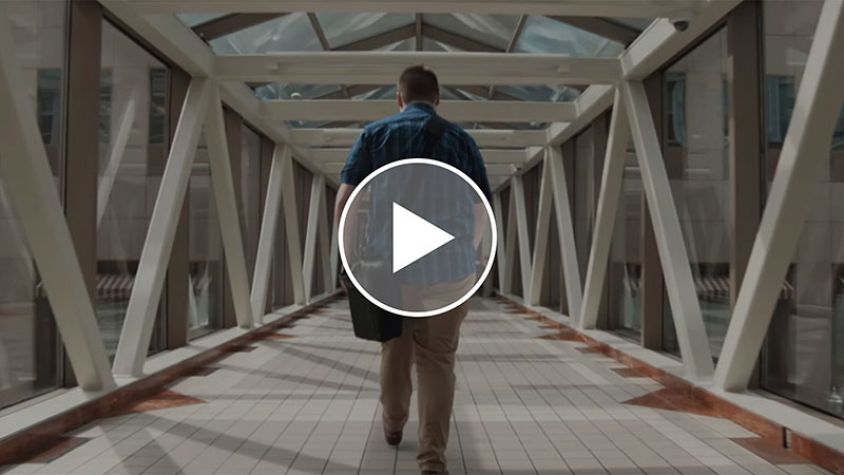Over 1 billion individuals identify as neurodivergent, including individuals with autism spectrum disorder (ASD), dyslexia, attention-deficit/hyperactivity disorder (ADHD), and more. It is estimated that 11% of college graduates are considered neurodivergent, though as much as 30% of any student body may fall into this category.1 However, individuals with ASD have a 90% underemployment rate, the highest of any demographic.2 Neurodivergent individuals make invaluable contributions to the workforce, so it is critical that both higher education institutions and potential employers make inclusion a priority.
The role higher education plays in neurodivergent students’ lives is a pivotal one—helping young adults lay the foundation for their life’s path. As these students begin their academic journeys, colleges and universities can help support their professional development, which is defined as educational and career training to support continuous new skill development, trend awareness, and career advancement. Some colleges and universities have already set strategies and programs in place to support their neurodiverse student population and ensure they're ready to enter the professional working world.
Potential employers can further set graduates up for success by adopting inclusive practices and continuing to build on the foundation established during their school years. Working together, higher education and employers can develop the future workforce and help to close the underemployment gap for neurodivergent individuals.
Providing accommodations to foster professional development
Creating an environment in which students can thrive is a significant aspect of higher education’s role in professional development. Forward-thinking colleges and universities know the impact this can have, ensuring that students are provided with accommodations specifically based on their individual needs and challenges.
Most, if not all, institutions have disability support offices that specifically work with individuals with disabilities to provide tailored support in the form of reasonable accommodations under the Americans with Disabilities Act (ADA) and offer additional resources they may need during their time on campus. This office often also serves as a personal support system for neurodivergent students, collaborating closely with them to ensure success as they further their education.
Providing accommodations to neurodivergent students can foster an environment where they are best able to learn and refine their skills. For example, many neurodivergent students need extra time on tests; disability support offices can work to provide this adjustment and ensure that sufficient time is given to complete exams without penalty. In doing so, the college or university will have made the learning environment more conducive to their students’ individual success. Having an office in place to facilitate this creates a more seamless experience for the student and reflects the institution’s commitment to equity in their learning environment.
Building a success plan for neurodivergent students
Even with the necessary resources in place, many students may need additional support and planning to fully realize their potential. Higher education institutions work closely with neurodivergent students to develop plans to build and refine their skills based on their individual needs. Whether through formal assessment or informal conversation, the resulting plans can help neurodivergent students understand how to best prepare for the future and develop the skills to get there.
In many cases, skills assessments and aptitude tests are conducted to help guide students and their advisors in the right direction. Assessments like the Strength Development Inventory (SDI), Myers-Briggs Type Indicator (MBTI), Strong Interest Inventory, and the RIASEC Test (realistic, investigative, artistic, social, enterprising, and conventional characteristic test) are commonly used to determine an individual’s strengths and interests. Additionally, the Birkman Assessment has proven to be particularly helpful for the neurodivergent population. With a solid understanding of their students’ strengths, accommodations, and career interests, colleges and universities can foster an environment that encourages sustainable professional development.
Developing the skills for success
By providing consistent support and personalized education, colleges and universities create an environment that cultivates long-term success and independence for neurodivergent individuals. With accommodations in place and customized education plans, students can effectively develop the skills they need to thrive post-graduation. The degree of collaboration between students and their schools will vary depending on the students’ preferences.
There are 2 main components to skill development in higher education, both of which are critical success factors. First, schools must teach the “hard skills” necessary for students to succeed in their careers. These skills vary depending on the individual student’s career goals and are often dictated by the student’s major/minor and course selections. While these skills are paramount to success post-graduation, professional development doesn’t stop there. Students must also leave college or university with an understanding of "soft skills" that are equally as critical to their long-term success, such as self-advocacy, independence, collaboration, and time management, to name a few. The refinement of both skill sets will help students succeed not only in their day-to-day work but also in their long-term career development.
Colleges and universities are in a unique position to make the future workforce more inclusive—and the impacts of this go beyond diversity, equity, and inclusion initiatives. With the right structure to support cultural integration, supervision, and skill development, the business value of neurodiversity is greater than industry standards. When neurodiverse teams are measured against other teams, they consistently exceed expectations. By developing the skillsets needed for neurodivergent students to succeed in their careers, higher education institutions can impact the future workforce in the long term.
Conclusion
While professional development is a lifelong journey, colleges and universities play a pivotal role in shaping the future of neurodivergent students. With personalized guidance and intentional programming, higher education institutions can provide the foundation for neurodivergent students to thrive post-graduation. The degree of involvement depends on the student’s individual preferences and support needs—what’s most important is that resources are both available and accessible. All students deserve the opportunity to thrive during college and beyond, and this is only possible in an environment conducive to effective professional development.
Learn more about how neurodiversity employment programs can work in tandem with higher education to elevate professional development for neurodivergent employees.
This article includes insight gathered from interviews with professionals employed by Marshall University ↗, Landmark College ↗, and the University of Delaware ↗.
Endnotes
- “The NCES Fast Facts Tool Provides Quick Answers to Many Education Questions (National Center for Education Statistics).” National Center for Education Statistics (NCES) Home Page, a part of the U.S. Department of Education. Accessed September 18, 2022. https://nces.ed.gov/fastfacts/display.asp?id=60. ↩
- Combs, Danny. Supporting Neurodivergent and Autistic People for Their Transition into Adulthood: Blueprints for Education, Training, and Employment. New York, NY: Routledge, 2023. ↩




